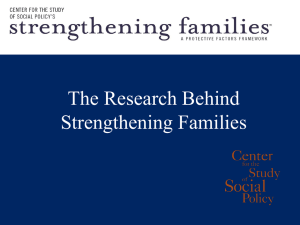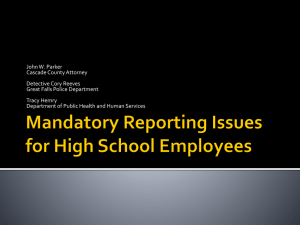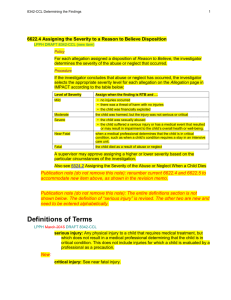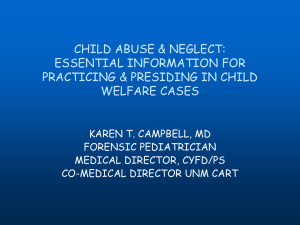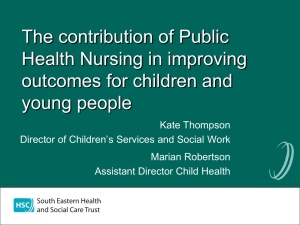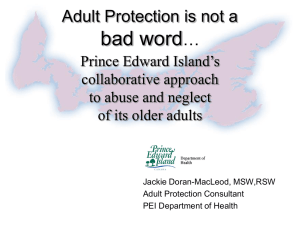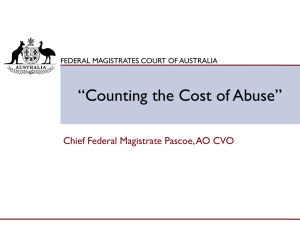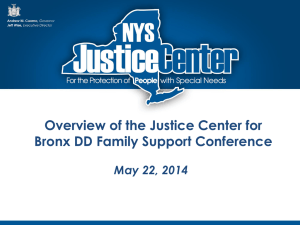2m-HB-13-1259_Cheat_Sheets
advertisement
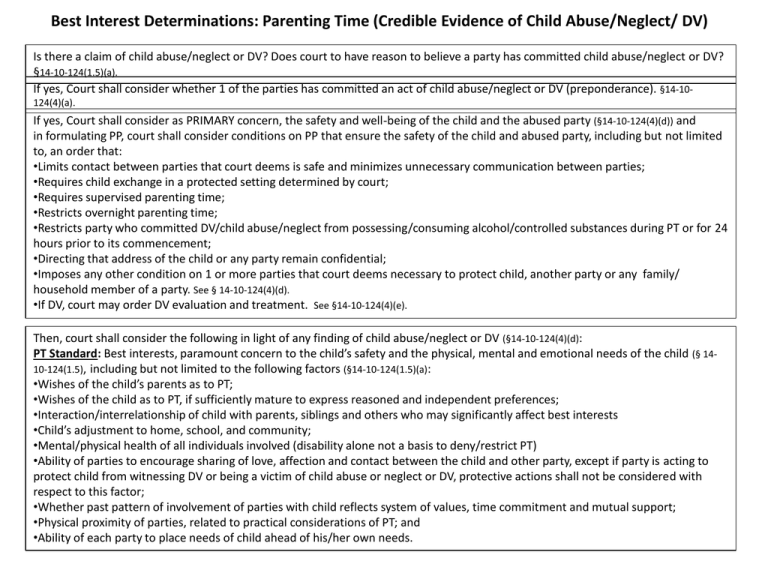
Best Interest Determinations: Parenting Time (Credible Evidence of Child Abuse/Neglect/ DV) Is there a claim of child abuse/neglect or DV? Does court to have reason to believe a party has committed child abuse/neglect or DV? §14-10-124(1.5)(a). If yes, Court shall consider whether 1 of the parties has committed an act of child abuse/neglect or DV (preponderance). §14-10124(4)(a). If yes, Court shall consider as PRIMARY concern, the safety and well-being of the child and the abused party (§14-10-124(4)(d)) and in formulating PP, court shall consider conditions on PP that ensure the safety of the child and abused party, including but not limited to, an order that: •Limits contact between parties that court deems is safe and minimizes unnecessary communication between parties; •Requires child exchange in a protected setting determined by court; •Requires supervised parenting time; •Restricts overnight parenting time; •Restricts party who committed DV/child abuse/neglect from possessing/consuming alcohol/controlled substances during PT or for 24 hours prior to its commencement; •Directing that address of the child or any party remain confidential; •Imposes any other condition on 1 or more parties that court deems necessary to protect child, another party or any family/ household member of a party. See § 14-10-124(4)(d). •If DV, court may order DV evaluation and treatment. See §14-10-124(4)(e). Then, court shall consider the following in light of any finding of child abuse/neglect or DV (§14-10-124(4)(d): PT Standard: Best interests, paramount concern to the child’s safety and the physical, mental and emotional needs of the child (§ 1410-124(1.5), including but not limited to the following factors (§14-10-124(1.5)(a): •Wishes of the child’s parents as to PT; •Wishes of the child as to PT, if sufficiently mature to express reasoned and independent preferences; •Interaction/interrelationship of child with parents, siblings and others who may significantly affect best interests •Child’s adjustment to home, school, and community; •Mental/physical health of all individuals involved (disability alone not a basis to deny/restrict PT) •Ability of parties to encourage sharing of love, affection and contact between the child and other party, except if party is acting to protect child from witnessing DV or being a victim of child abuse or neglect or DV, protective actions shall not be considered with respect to this factor; •Whether past pattern of involvement of parties with child reflects system of values, time commitment and mutual support; •Physical proximity of parties, related to practical considerations of PT; and •Ability of each party to place needs of child ahead of his/her own needs. Regarding Decision-Making, Consider Also: §14-10-124(1.5)(b) Credible evidence of ability of parties to cooperate/make decisions jointly; Whether past pattern of involvement of parties with child reflects a system of values, time commitment, and mutual support that would indicate an ability as mutual decision-makers to provide a positive and nourishing relationship with the child; Whether an allocation of mutual DM responsibility on any one or a number of issues will promote more frequent or continuing contact between the child and each of the parents. Required Findings by Court If court finds that PT would endanger child’s physical health or significantly impair child’s emotional development, any order imposing or continuing PT restrictions shall enumerate specific factual findings supporting the restriction. §14-10-124(1.5)(a). If contested or “where appropriate,” order must be specific as possible, clearly address current and future family needs. Order should include: •Type of DM •Practical PT schedule, including holidays/school vacations •Child exchange procedures (location and transportation details) •Manner of communication (method and frequency) •Communication between parent/child outside of parenting time (method and frequency) •Any other orders in best interests of child. §14-10-124(7). In contested hearings on final orders re APR, court shall make findings on the record concerning factors court considered and reasons why APR is in child’s best interests. §14-10-124(1.7). Best Interest Determinations: Parenting Time (No Credible Evidence of Child Abuse/Neglect/DV) Is there a claim of child abuse/neglect or DV? Does the court to have reason to believe a party has committed child abuse/neglect or DV? §14-10-124(1.5)(a). If not, the court shall consider the following (§14-10-124(4)): PT Standard: Best interests, paramount concern to the child’s safety and the physical, mental and emotional needs of the child (§ 14-10-124(1.5), including but not limited to the following factors (§14-10-124(1.5)(a): •Wishes of the child’s parents as to PT; •Wishes of the child as to PT, if sufficiently mature to express reasoned and independent preferences; •Interaction/interrelationship of child with parents, siblings and others who may significantly affect best interests •Child’s adjustment to home, school, and community; •Mental/physical health of all individuals involved (disability alone not a basis to deny/restrict PT) •Ability of parties to encourage sharing of love, affection and contact between the child and other party, except if party is acting to protect child from witnessing DV or being a victim of child abuse or neglect or DV, protective actions shall not be considered with respect to this factor; •Whether past pattern of involvement of parties with child reflects system of values, time commitment and mutual support; •Physical proximity of parties, related to practical considerations of PT; and •Ability of each party to place needs of child ahead of his/her own needs. Regarding Decision-Making, Consider §14-10-124(1.5)(b) •Credible evidence of ability of parties to cooperate/make decisions jointly; •Whether past pattern of involvement of parties with child reflects a system of values, time commitment, and mutual support that would indicate an ability as mutual decision-makers to provide a positive and nourishing relationship with the child; •Whether an allocation of mutual DM responsibility on any one or a number of issues will promote more frequent or continuing contact between the child and each of the parents.
